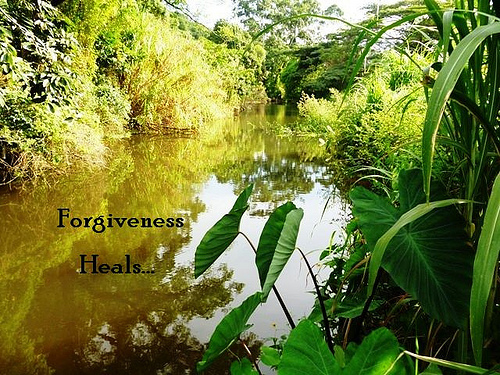The Real Role of Forgiveness: Bringing Back Wellness – Vol. 369, July 7, 2016
Many people believe that to forgive is to forget. I have had many clients who felt that this was true, and in some cases they made it much harder to do the forgiveness healing work. From my perspective it is important to forgive those who you felt harmed you, because if you do not, their past behavior will always be in charge of your feelings. That is way too high a price to pay, especially since the person that you felt harmed you has moved on in life, usually without a thought of you in their mind. If they have passed on, then a ghost of sorts is ruling your feelings. If you think about this, it’s a rather crazy way to live, especially because of the direct impact it has on one’s health.
It has been found through research that by holding onto resentment, all the chemicals of the stress response are released: adrenaline, cortisol and norepinephrine. These chemicals take away one’s ability to think creatively limiting problem solving. After a while, one is unable to think, leaving the feeling of helplessness, while taking on the role of a ‘victim.’ This according to the work of Dr. Frederick Luskin, cofounder of the Stanford Forgiveness project. This project has shown that when one forgives the levels of anger, anxiety, and depression go down while elevating mood and optimism.
With the use of fMRI scanners, it was found by Dr. Pietro Pietrini at the University of Pisa in Italy, that anger and vengeance inhibited rational thinking and caused the amygdala to increase its activity. This process causes the fight-or flight response. Reason is gone due to anger and rage. Interestingly enough, the prefrontal cortex and posterior cingulate, which are the more recently evolved parts of our brains, do the problem solving, empathy and emotional control.
Now, this is very important to understand because the state of our mind has much to do with our physical health as well. Before the physiology was understood regarding the role of forgiveness, Dr. Dabney Ewin, a surgeon specializing in burns started using hypnosis with his patients. He found that by having them imagine their burned areas packed in ice, their pain decreased considerably. However, when he had angry, resentful patients that underwent skin grafts, the grafts would not take. It was then that he realized that these patients were all burned up figuratively and literally and with good reason. So, he decided to help them along with hypnosis to forgive whoever they felt caused the burn. He found that they were able to heal much quicker as a result of doing the forgiveness work.
In my work with my clients, I always do forgiveness work. Because it is during the forgiveness work that they are able to let go of the anger and resentment and many seemingly physical ailments they have that were caused by holding on to the resentment. My clients are taught that forgiveness is not the same as forgetting, because if we forget being hurt by someone, we could very well be hurt again. However, by understanding that all people are doing the best that they can, and that people are not their behavior, including the client, an understanding of the other person’s perspective comes into the client’s consciousness allowing the client to finally let go of the anger, resentment and hurt. Using hypnotic techniques this is a process that takes mere minutes to achieve in most cases. However, the most important person for the client to forgive would be themselves. They are in my practice because they were dealing with some very negative issues that needed to be resolved after all. Once the forgiveness is complete, the clients always report feeling, “lighter and brighter.”
Because there isn’t a person alive who hasn’t done something that may have hurt someone in one way or another, it is important for all of us to remember that we too may have hurt someone with something we said, something we did, or something we promised and never followed through on. This being the case, it becomes much easier to forgive others for their trespasses.
Most importantly, I let my clients know that the harsher the trespass the deeper the positive learnings they will have, allowing them to finally move on with their lives – with a healthier psychological and physiological state.
Note: The studies commented on in is weblog came from Salon, in an article published August 23, 2015 by Megan Feldman Bettencourt, The Science of Forgiveness: “When you don’t forgive you release all the chemicals of the stress response”








